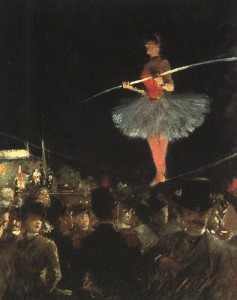I often think of the act of creating great art as a balancing of universal and particular elements within a work. The artist must walk a tightrope, to borrow an idea from Juliette Aristides; his balancing act is between two extremes, but in order to keep his balance he  must distribute his weight into both extremes (hence tight rope walkers hold the long pole to keep their balance). They must extend their weight into the extremes, in the case of the artist, he must present his subject in universal and particular terms. I cannot think of another artist who understands this concept better than Shakespeare. His character Theseus, speaking to Hippolyta, says that “the lunatic, the lover, and the poet / Are of imagination all compact.” It is incredible to hear Shakespeare talk of “the poet” in broad terms, and in some removed and qualified way, he seems to be speaking of himself in his own role as poet. The poet’s act of creation is a stretching out into the realm of heaven and earth (universal and particular):
must distribute his weight into both extremes (hence tight rope walkers hold the long pole to keep their balance). They must extend their weight into the extremes, in the case of the artist, he must present his subject in universal and particular terms. I cannot think of another artist who understands this concept better than Shakespeare. His character Theseus, speaking to Hippolyta, says that “the lunatic, the lover, and the poet / Are of imagination all compact.” It is incredible to hear Shakespeare talk of “the poet” in broad terms, and in some removed and qualified way, he seems to be speaking of himself in his own role as poet. The poet’s act of creation is a stretching out into the realm of heaven and earth (universal and particular):
The poet’s eye, in fine frenzy rolling,
Doth glance from heaven to earth, from earth to heaven;
And as imagination bodies forth
The forms of things unknown, the poet’s pen
Turns them to shapes and gives to airy nothing
A local habitation and a name.
It is the same of the artist making great works. He must body forth his imagination, put into some particular form a universal ideal, those two must intermingle and mix together in order to create the greatest art. There is something immaterial that Shakespeare gets at to, the “airy nothing” must occupy a “local habitation and a name.”
Here is the rest of the speech:
THESEUS
More strange than true: I never may believe
These antique fables, nor these fairy toys.
Lovers and madmen have such seething brains,
Such shaping fantasies, that apprehend
More than cool reason ever comprehends.
The lunatic, the lover and the poet
Are of imagination all compact:
One sees more devils than vast hell can hold,
That is, the madman: the lover, all as frantic,
Sees Helen’s beauty in a brow of Egypt:
The poet’s eye, in fine frenzy rolling,
Doth glance from heaven to earth, from earth to heaven;
And as imagination bodies forth
The forms of things unknown, the poet’s pen
Turns them to shapes and gives to airy nothing
A local habitation and a name.
Such tricks hath strong imagination,
That if it would but apprehend some joy,
It comprehends some bringer of that joy;
Or in the night, imagining some fear,
How easy is a bush supposed a bear!


Upon further reflection I decided that this speech by Theseus is rather dark. I was speaking with a colleague of mine about these lines. After that conversation we concluded that Theseus’ view of the poet is cold and calculated, like one who has not been touched by divine madness. Theseus wants to reduce to poet to someone who is sick and thinks things up from nothing, like someone being frightened in the dark imagines “a bush supposed a bear.” However, Hippolyta’s response to her husband (it’s significant that this is a conversation between husband and wife) is marvelous; she says:
But all the story of the night told over,
And all their minds transfigured so together,
More witnesseth than fancy’s images
And grows to something of great constancy;
But, howsoever, strange and admirable.